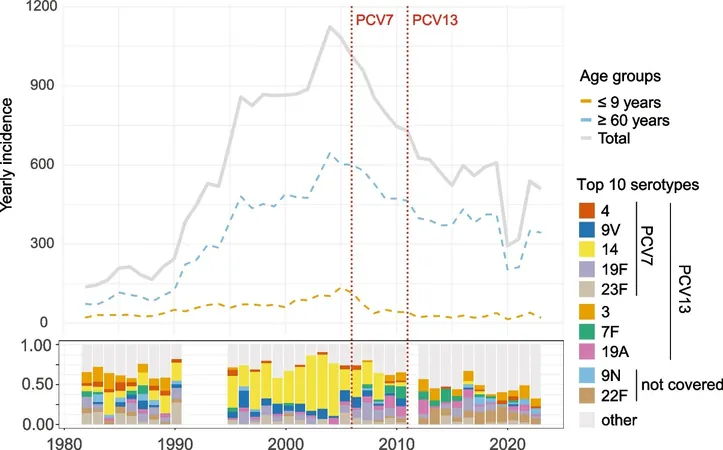
Groundbreaking Study Shows Child Immunization Program Dramatically Reduces Meningitis and Blood Poisoning Cases
2024-11-08
Author: Liam
Introduction
A recent study has revealed a significant drop in cases of meningitis and blood poisoning, attributing this positive trend to the inclusion of pneumococcal disease in the child immunization program since 2006. This initiative seems to be making waves in public health, with the annual cases plummeting from over 1,000 before 2006 to about 600 in 2022 and 2023.
Improvements in Child Health
Dr. Vegard Eldholm, a research scientist at the Norwegian Institute of Public Health (FHI), points out that the most remarkable improvements are seen in children under the age of 10. For instance, invasive pneumococcal disease cases in this age group fell dramatically from 136 in 2005 to just 27 reported in 2023. This indicates the effectiveness of immunization in not only reducing illness among children but also in safeguarding vulnerable elderly populations, as fewer children contracting the disease means fewer infections are transmitted to older family members.
Collaborative Research Efforts
The extensive study was a collaborative effort between FHI, the Institute of Basic Medical Sciences (IMB), and others, culminating in a publication in the peer-reviewed journal *Genome Medicine*. The research utilized a vast database of samples dating back to the 1980s, enabling scientists to better understand the evolution of pneumococcal bacteria and improve vaccine development.
Vaccine Targeting and Effectiveness
One key aspect of the pneumococcal bacteria that the vaccine targets is its polysaccharide capsule, analogous to the spike protein associated with COVID-19. Dr. Eldholm explains that the current pneumococcal vaccine recognizes 13 out of nearly 100 known capsule types, specifically identifying those that most frequently cause severe illness.
Challenges and Future Directions
Despite the successful vaccination efforts, the study highlights a looming challenge: pneumococci are gradually “escaping” from current vaccines by evolving new serotypes. This necessitates ongoing surveillance of the pneumococcal population to ensure that future vaccines remain effective.
Exciting Developments Ahead
Looking ahead, exciting developments are on the horizon. New vaccines capable of recognizing more capsule types are being developed, with one recently approved by the European Commission that can identify 20 capsule types. Dr. Rebecca Ashley Gladstone, a postdoctoral fellow at IMB, emphasizes the importance of continuous monitoring to adapt immunization strategies to combat these emerging threats effectively.
Conclusion
This groundbreaking advancement in immunization not only underscores the effectiveness of childhood vaccinations but also serves as a reminder of the need for vigilance against bacteria that continue to adapt and evolve. The strides made in combating meningitis and blood poisoning highlight the critical role of vaccination programs in safeguarding public health and the importance of investing in research for future innovations.









 Brasil (PT)
Brasil (PT)
 Canada (EN)
Canada (EN)
 Chile (ES)
Chile (ES)
 España (ES)
España (ES)
 France (FR)
France (FR)
 Hong Kong (EN)
Hong Kong (EN)
 Italia (IT)
Italia (IT)
 日本 (JA)
日本 (JA)
 Magyarország (HU)
Magyarország (HU)
 Norge (NO)
Norge (NO)
 Polska (PL)
Polska (PL)
 Schweiz (DE)
Schweiz (DE)
 Singapore (EN)
Singapore (EN)
 Sverige (SV)
Sverige (SV)
 Suomi (FI)
Suomi (FI)
 Türkiye (TR)
Türkiye (TR)